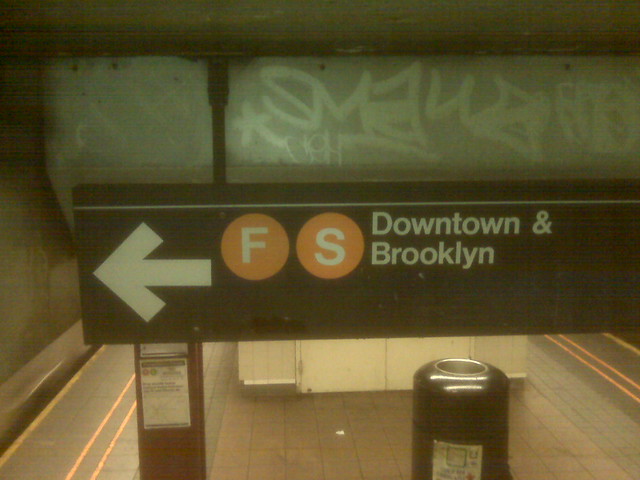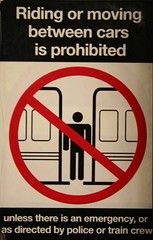 As transit economics and funding go, we are not living in a golden age. State and city contributions to their public transit systems are on the decline, and as both operating costs and pension obligations climb, transit agencies have left no stone unturned in their quest for revenue. From service cuts to fare hikes to internal reorganization, if the move saves dollars, it’s on the table.
As transit economics and funding go, we are not living in a golden age. State and city contributions to their public transit systems are on the decline, and as both operating costs and pension obligations climb, transit agencies have left no stone unturned in their quest for revenue. From service cuts to fare hikes to internal reorganization, if the move saves dollars, it’s on the table.
For many transit agencies, advertising remains one of the last great untapped resources. In New York, the MTA draws in over $125 million annually, up from just $36 million in 1997, and yet, the ads we see in subway cars and on buses are often poor in quality. Considering the captive audience, I have to believe transit agencies could be doing a better job of selling space to companies willing to pay a pretty penny for the eyeballs.
Outside of traditional in-car display advertisements, train car wraps and station treatments, naming rights remain a potential, if controversial, source of revenue, and over the past few years, we’ve seen American transit agencies awkwardly and tentatively embrace station naming deals. The MTA faltered in its first attempts when Citi Bank refused to pony up the dollars to name the 7 stop at Willets Point after Citi Field, but it secured a 20-year, $4-million commitment from Barclays to append the name of the Nets’ new arean to the Atlantic Ave./Pacific St. hub. Other than that one failure and one success, all has been quiet on the naming rights front.
Outside of New York, transit officials have engaged in stop-and-go efforts to secure naming rights. In Philadelphia, the Pattison Ave. station at Broad St. has been renamed the AT&T stop. By removing the geographic identifiers from the station name, SEPTA has made it harder for those unfamiliar with the system to reach their destination, and I have long believed the Philly approach is the wrong one to take for station naming deals.
In Chicago, something new and different is emerging. A few weeks ago, the Chicago Transit Authority reopened the renovated North/Clybourn station, and the ceremony was significant because Apple, the computer giant which was opening a store nearby, had paid for the station renovations. The deal Apple signed with the CTA allowed them right of first refusal for the station name if the authority were to sell the naming rights, and now it appears as though the CTA is prepared to do just that.
As Mary Wisniewski of The Chicago Sun-Times reported yesterday, the CTA board has begun to explore corporate naming rights deals. She writes:
On Wednesday, the CTA board asked for bids from firms that would help seek corporate sponsorships to bring in revenues beyond what the CTA already gets from ads on buses, trains and stations.
The deals could involve naming rights or other ideas, such as sponsorship of the CTA’s planned bus rapid-transit route on the Jeffery corridor or the New Year’s Eve “penny-a-ride” program. “I’m not looking for your traditional commitment to just advertise more on the system,” CTA President Richard Rodriguez said. “I’m looking for creative ideas.”
Rodriguez said he was in London on a speaking engagement earlier in the year and realized that across Europe, transit systems are looking into sponsorship ideas. “I can’t even imagine what the opportunities might be,” Rodriguez said. The firm would be paid a portion of the revenues it generated.
For U.S.-based transit, Chicago’s bidding results could be a harbinger of things to come. If companies are willing to pay money to secure these naming rights, there is absolutely nothing stopping other transit agencies from jumping onto this fiscal bandwagon. Rodriguez, the CTA’s head, doesn’t know what to expect, but at least some prominent companies will bid for high-traffic stations or prominent events.
As transit agencies, then, head into uncharted territories, how best should they structure these naming rights deals? Sports stadiums, for instance, have embraced corporate names but have sacrificed any local identity. Would a casual fan know that the Cincinnati Reds play in Great American Ballpark? Where is the Wells Fargo Center and which teams play there? Few people outside of Philadelphia could answer that question.
So the right approach involves appending instead of replacing. Renaming Times Square, originally a corporate name in its own right, to the Walt Disney Station does no one any favors, but calling it Times Square/Walt Disney, while painful to see, doesn’t remove the key geographical signifier. Since a transit system is in the business of getting people from Point A to Point B, it must ensure that people know where Point B is.
Other than that, all bets are off. Whether any substantial amount of money can be generated from these potential deals though remains to be seen.




 Don’t expect to build up that collection of unused MetroCards in anticipation of the looming fare hike, New York City Transit warned today. When the fares go up on December 30, straphangers will have only a few weeks to activate unused MetroCards, but those who count their days properly could still find enough time to buy an extra $89 30-day cards before the price spikes to $104.
Don’t expect to build up that collection of unused MetroCards in anticipation of the looming fare hike, New York City Transit warned today. When the fares go up on December 30, straphangers will have only a few weeks to activate unused MetroCards, but those who count their days properly could still find enough time to buy an extra $89 30-day cards before the price spikes to $104. There’s something inherently New York about walking in between subway cars. At one point or another, nearly every straphanger takes that plunge and moves between cars while the train is in motion. For some, the rush of the tunnel is excuse enough to stop outside of the cocoon of the enclosed subway car while for others, it’s a means to an end. The homeless guy is stinking up the joint. The air condition doesn’t work. Get me out of here.
There’s something inherently New York about walking in between subway cars. At one point or another, nearly every straphanger takes that plunge and moves between cars while the train is in motion. For some, the rush of the tunnel is excuse enough to stop outside of the cocoon of the enclosed subway car while for others, it’s a means to an end. The homeless guy is stinking up the joint. The air condition doesn’t work. Get me out of here.